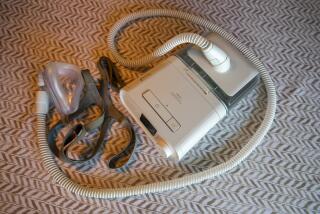Firm Halts Production of Heart Valves After 6 Deaths
An Orange County company has stopped manufacturing its primary line of mechanical heart valves after reports of six deaths linked to malfunctions of the devices.
According the U.S. Food and Drug Administration, about 20,000 of the valves manufactured in Irvine by the Edwards Division of Baxter International have been implanted in patients in the United States and overseas.
Physicians have been urged to closely monitor recipients, rather than remove the valves already in place, Walter Schneggenburger, head of the federal agencyâs Santa Ana office, said Monday. In addition, Edwards has asked physicians, hospitals and dealers to return an estimated 6,000 valves that have not yet been used.
Edwards is one of the nationâs leading manufacturers of both mechanical and organic tissue heart valves. Baxter, its parent company, is headquartered in Deerfield, Ill.
The heart valves in question were marketed as Edwards Duromedics Aortic Bileaflet Valve Model 3160 and Mitral Bileaflet Valve Model 9120. They are of the carbon bileaflet variety, which have become the mechanical valves of preference among heart surgeons in recent years, industry experts said.
So far, the FDA has received reports of 12 valve malfunctions, of which six resulted in death. In each instance, gate-like âleafletsâ regulating the flow of blood through the valves broke loose, Schneggenburger said.
Decision Made
The company said it decided to stop manufacturing the valves until the cause of the malfunctions can be determined, including whether they are related to design or manufacturing problems.
âWe have notified our entire physician base nationwide,â said Baxter spokesman Les Jacobson.
âTwelve (malfunctions) out of 20,000 is a very small number,â he said. âBut it was disturbing enough for us to decide to do the prudent thing.â
The FDA is not recommending removal of the valves because medical experts have told the agency that removing the valves could pose a greater health risk to recipients than leaving them in place, Schneggenburger said.
According to FDA officials, Edwards suspended all marketing of the carbon bileaflet valves on May 16 and stopped manufacturing shortly thereafter.
Jacobson said that all malfunctions reported to date have involved heart valves sold overseas. Most of the 20,000 patients who have received the valves are overseas because the valves in question have been approved for marketing in the United States only since May, 1987.
No pattern has emerged regarding the kind of patients who have experienced heart valve breakages, he said. Those reported so far have included men, women and children whose implants had been in place anywhere from five to 36 months.
Acquired Firm
According to the FDA, the faulty valves were manufactured at plants in Austin, Tex., and in Shelkshine, Scotland, from 1983 through August, 1986, by Hemex Scientific, which was acquired by Baxter in December, 1986.
After the acquisition, Baxter incorporated some design changes in the valves, Jacobson said. It is not known if those changes made the valves less prone to breakage, he said.
Industry observers said the $50-million Hemex acquisition was important to Baxter because its existing line of âcage-ballâ mechanical heart valves was becoming outmoded and losing its market to carbon bileaflet valves, which were believed to impede blood flow to a lesser extent.
âThey really needed a carbon bileaflet valve to compete in the mechanical heart valve market,â said Pieter Halter, a former director of sales and marketing for Edwards. Halter, who is now a health care specialist for a Southern California venture capital firm, estimates that carbon bileaflet valves make up 90% of the mechanical heart valve market.
Chief Competitors
Competing carbon bileaflet valves are sold by Edwardsâ chief competitors, St. Jude Medical of St. Paul, Minn., and Medtronic Inc. of Minneapolis, Minn.
Last year, Edwards carbon bileaflet valves generated $12 million in sales for Baxter, a major health product company with $6 billion in total revenues.
âThe mechanical valve market has been growing, and this represents our major thrust in it,â Jacobson said.
He called the voluntary recall âa setback but hopefully a temporary one.â
More to Read
Inside the business of entertainment
The Wide Shot brings you news, analysis and insights on everything from streaming wars to production â and what it all means for the future.
You may occasionally receive promotional content from the Los Angeles Times.










